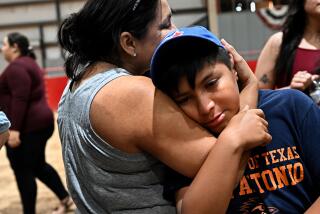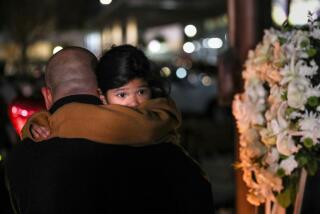In Search of Roots of Violence
- Share via
Just before his students were about to take the Stanford 9 standardized test, Principal Howard Haas was exhorting his La Mirada High School teenagers to hunker down and perform well.
They just looked at him. His talk came five days after the Littleton, Colo., shootings last April, and it was easy to see that they were not listening.
“I saw my kids were traumatized and frightened. They were scared to come to school and really weren’t focusing on this test,” he said.
And neither was he. Like his students, he wanted to know why the tragedy had happened.
He had listened to pundits and experts, psychologists and sheriffs discuss why kids kill, but none of the answers satisfied him.
What has led teenage boys in rural towns and comfortable suburbs, rich boys and poor ones, to ambush their classmates at school and gun them down, he wondered.
Now Haas, 49, a Mission Viejo resident, is the former principal at La Mirada High School. He and friend Alex Aitcheson, 48, an administrator at Valverde Unified School District in Riverside County, have resigned from their jobs and will head out across the country for about two months to ask kids themselves.
They have hired two freelance cameramen to accompany them and plan to make a documentary at the end of their journey.
Friends since Haas was principal and Aitcheson vice principal for one year at Santa Ana’s Willard Intermediate School in 1985, the two have stayed close over the years.
When they return, both will take teaching positions.
Even before they planned the trip, the two say, school administration had begun to wear on them as state-imposed reforms and legislation affected educators.
“I was at a meeting about ending social promotion and none of the principals present thought the legislation was well done, but then we had to sit around and figure out how to implement it,” Haas said. “I said, ‘I don’t belong at this table.’ ”
Norwalk-La Mirada Unified school officials were caught off guard by Haas’ resignation, but are very supportive of the trip.
“We were a little stunned by this announcement, but we understood,” said Darryl Adams, a trustee for Norwalk-La Mirada Unified, which will give Haas a teaching job when he returns.
“He’s always talked about people doing what they believe in,” Adams said. “He teaches his students that it’s the passion that drives your success, not monetary or materialistic things, so in that light this trip makes sense.”
Although the Littleton shootings were the final tragedy that sparked their plan, Haas and Aitcheson began discussing how they could do something about teenage violence after school shootings in Pearl, Miss.; West Paducah, Ky.; Jonesboro, Ark.; and Edinboro, Pa.
Each also has extensive experiences with troubled youths--as all principals do, they said. And before working in California, Aitcheson taught at a program for criminal teenagers in Boston.
“I’ve had kids who looked at me with blank eyes, and I’ve said to security guards, ‘That’s the kind of kid who will come back to shoot me later,’ ” Haas said.
The pair leave Aug. 2. Once on the road, they plan to frequent malls and movie theaters, playgrounds, pools and anywhere else youths gather, to ask why some teenagers kill.
An orange ink trail outlines their circuit on a large map of the U.S. in Haas’ living room. They will stop in about 40 cities, including Las Vegas; Des Moines; Boston; Newark, N.J.; Greenwich, Conn.; Atlanta; Selma, Ala.; Dallas; and Phoenix.
Once in a given city, they will improvise, having arranged no introductions or meetings ahead of time.
“We haven’t set up any interviews because if we called a principal in Selma, for example, they’d get us the best kids to talk to,” Haas said. The two will make daily updates to their Web site, www.childrenscrusade.com, and hope to have conversations with youths throughout America about violence.
Both men borrowed money to finance the $60,000 to $70,000 trip, but the La Mirada Kiwanis Club is helping by asking Kiwanis families in the cities Haas and Aitcheson visit to house them for a day or two.
Both are married. Their wives will try to join them at some point, but for the most part will be staying at home. Even so, they’re supporting their husbands’ cross-country journey and the borrowing it took to make it happen.
“I think it’s just great,” said Sharon Haas. “We were so worried about the schools when all that was happening that I’m looking forward to the answers as much as the next guy.”
Talking about their plans, the two try not to come to any conclusions.
But they do shake their heads over cultural trends they believe have left kids floundering: that notions of right and wrong are relative and not absolutes, the competition and pressure on boys to be strong.
Then there is the pressure to conform that crushes youthful individuality at the moments it should be flourishing.
Take dress codes. Both men see the necessity, but believe that while they may protect children from gang aggression, dress codes stifle self-expression.
“My school had the tightest dress code on the planet--I’m a great believer in dress codes, because it keeps the kids safe,” Haas said. “But they’re the worst things in the world.”
When he worked with troubled youths in Boston--some of whom had been convicted of robbing, raping and victimizing other children--Aitcheson said he quickly learned that the only way to find out the roots of their behavior was to listen to them.
“That’s what we plan to do,” he said. “We plan to go out there and listen.”
More to Read
Sign up for Essential California
The most important California stories and recommendations in your inbox every morning.
You may occasionally receive promotional content from the Los Angeles Times.













